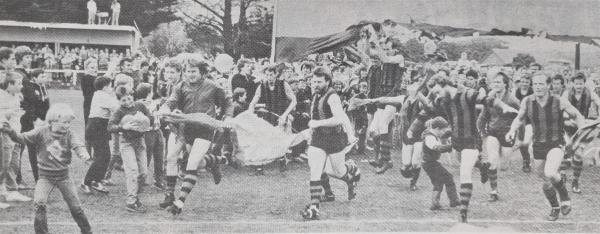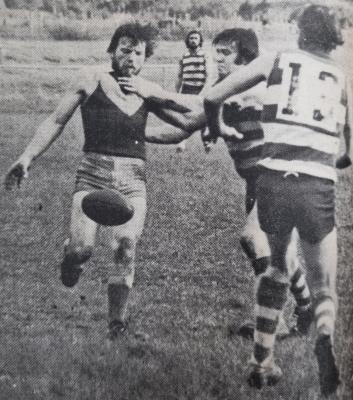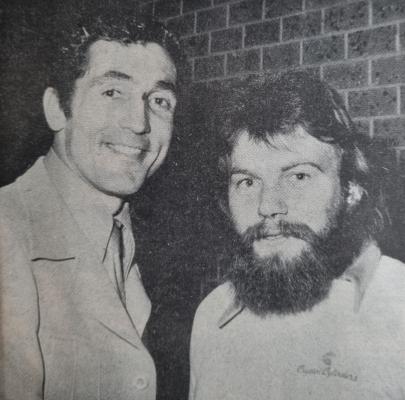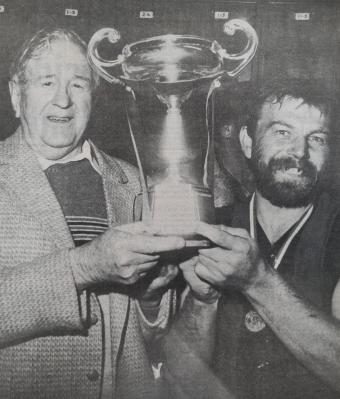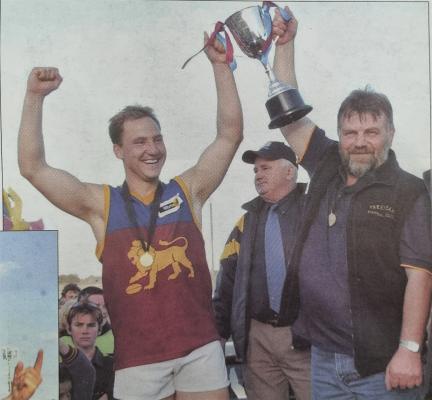
By David Nagel
Joe Lenders is one of the truly iconic figures of local football who carried a fearsome reputation across a commanding football journey than spanned an incredible 50 years.
Short and stocky, with a fierce determination and deep booming voice, Lenders was a leader of men throughout his career and a bonafide legend of the West Gippsland Football League (WGFL).
His career…well it speaks for itself.
As a rugged but extremely fit midfielder he won back-to-back WGFL Breheny Medals in 1977/78, and as a playing coach led Garfield and Cora Lynn to two of the more memorable premierships in club history.
And once the boots were firmly tucked away, Lenders would lead Pakenham to the ultimate success as a mentor and coach from the sidelines.
Joe Lenders was born in Holland in June 1954 and is one of six children born to Gerard and Mary, who brought the Lenders family to Australia, in search of a better life, in September 1956.
The Lenders family originally settled in Dalmore, on an Italian-owned property that was ploughed for potatoes and onions. The family then moved to a share farm in Catani, before purchasing a property in Garfield, at the bottom of the Garfield Hill, just up from the footy ground.
“Dad was a dairy farmer and there were eight of us in a little two-bedroom home,” Lenders remembered clearly, his deep voice still as distinct as ever.
“That’s the way it was done in those days, you had your own little veggie garden, you worked hard, you had your chooks and your ducks and pigs, and milked a few cows.”
Lenders and his five siblings, Elizabeth, Hank, Martin, Mary and Alda, would ride their pushbikes to school – rain, hail or shine – to St Joseph’s in Iona….but not before completing a few household chores.
“Dad milked the cows in the morning, then worked at the Longwarry Butter Factory, and we helped mum with the cleaning – I remember plenty of times riding to school with cow shit all over me,” Lenders recalled.
“I was a reasonable student. St Joseph’s had the nuns and we were too scared to move out of line and get ourselves in trouble. Even sport wasn’t an option at that stage, we were all more interested in getting home from school and doing our chores.
“Dad wasn’t a hard man, but he made sure we did the right thing.
“Once I had a flat tyre and I forget to tell him the night before school. I told him in the morning and he said ‘Too bad, I have to go to work. If you get tired of walking, start running.”
Lenders was an impressionable 10-year-old when he first discovered the game of football.
St Joseph’s would take on school teams from Nar Nar Goon and Cora Lynn in annual battles, but it was on his way to Cubs, with good friend Colin Giblin…where he uncovered the joy of the Garfield Football Club.
“Colin and I had to ride our bikes past the Garfield football ground and we would watch the senior team train,” Lenders said.
“Garfield was premiers in 1963 and ’64, got beaten in the grand final in 65, and won it again in ’66.
“The whole town was all about the Garfield footy club back then. It was all people spoke about around the town.
“We had another block at the corner of the footy ground and we were supposed to be chopping thistles and tussocks, but we’d sneak over the fence and watch a bit of footy.
“Frosty Miller was emerging, he was a cut above the rest, and that excitement gave me the urge to find out what all this talk was about…it got me interested.”
“I talked Colin into playing footy with me. I loved my footy; it looked like a good thing to do. Dad wasn’t that keen but mum encouraged me to have a go…as long as I got myself there and back.”
A young Lenders would play several years in the under 16’s before progressing through the reserves to the seniors.
“I ended up a reasonable junior footballer and ended up captaining the club,” Lenders said.
“I played interleague and we had some really good players. Blokes like Danny Corcoran, Alan Goad and Geoff Ablett all ended up going to Hawthorn.
“I went to Hawthorn too but they told me I was too portly and too slow, so they didn’t keep me, I wasn’t really quick enough I don’t think,” he says with a chuckle.
Lenders was already showing early signs of leadership when he played his first senior game at Garfield at the age of 15. He captained the under 16’s, and then first year out of that age division was appointed coach.
“The junior committee couldn’t find a coach for the under 16’s so I put my hand up and had a go,” he said.
“I had no licence; we had parents picking up the coach and the players at the same time.
“Then I was coaching the under 14’s and under 16’s and also playing senior footy, she was a pretty busy day.
“But it was all worth it, we had some good kids come through and I learnt a lot more about myself.
“I was playing football and trying to teach others at the same time, and that developed my own game as well, it was a pretty steep learning curve.”
In hindsight, Lenders believes his love of coaching may have come from a deeper craving for empowerment.
“Football was a great out, because at home I was suppressed, my mother and father were very strong people and when I went to school, with the nuns and the Marist Brothers, you were also suppressed,” Lenders said.
“Football was a great out and a great opportunity to be able to express yourself.
“I felt very comfortable being my own man, because not very often was I allowed to do that in society at the time.
“To be captain, and then coach, and to be able to voice your opinion and tell other people what to do was something different and I felt comfortable doing that.
“Looking back at it now, maybe being suppressed at a young age was a driving force behind wanting to be a leader back then.”
Lenders’ earliest memories of his senior playing days revolve around Garfield’s full back at the time, Mick Preston.
“I started out as a little back pocket player, Mick Preston was full back, the best in the league, and he told me to stand 60 metres out on the boundary line and he would kick it to me from the kick outs,” he said.
“And he would hit me on the chest every time.
“At the same time we were getting belted in the under 16’s. Kooweerup would belt us, with all the O’Hehir boys, they’d kick 30 or 40 goals and if we kicked a couple I’d be rapt.
“Looking back it was a good grounding, and I always say it was a great thing for a lot of us, it made us more determined to play strong, hard football.
“We had no choice but to go and get the footy if we wanted it, otherwise you wouldn’t get a touch.”
Lenders would develop into one of the best and most feared midfielders in the competition, combining his stocky build, brute strength, and dedication to his fitness and craft to become the pre-eminent player in the league.
He would claim back-to-back Breheny Medals, in ‘77/78, with his head-down, bum-up approach earning him plenty of admirers, and the odd adversary.
“My strength was getting the football, I showed determination to the contest, more than average I would say, and I knew where the football was going,” he said.
“I really worked hard at that, and I worked really hard on my fitness to overcome my limitations in other areas.
“Tim Payne, Murray’s father, was president of the club and a mentor as I came through….he told me if you can’t read it properly then get yourself fit enough to get there first, and I took heed of that.”
Lenders is convincing when he suggests he was a hard and fair player, although his many tribunal appearances, and several suspensions, would suggest he did cross the line at times.
“People say I was rough, but it wasn’t that I meant to hit anyone, you went hard and whoever showed the most courage got the footy back in those days,” he said.
“I was desperate to be there first, and desperate for the ball, and when I got there I barrelled in and took a few prisoners along the way.”
Despite the outside perception of him being a rugged bruiser, Lenders thought about his football deeply and was always trying to stay one step ahead of the pack.
He would watch an enormous amount of football, watching star players and how they entered and exited packs, and turned himself from a consistent half-back-flanker into a dominant midfield proposition through the discipline of sheer hard work.
“I was picking potatoes, carting hay, and I would run five days a week, morning and night,” he said.
“I ended up running the mile in the Victorian Schoolboys and I got to the point where I was confident I could outrun anyone.
“I was a bit of a cheeky bugger and when I knew I had a tagger cooked I’d let them know about it.”
During his prime, in the late 70’s and early 80’s, Lenders had a target on his back and would not take a backward step, instead engaging in some of the brutal contests that were part and parcel of football back in the day.
“I did feel intimidated at times, I wasn’t really big and a few blokes wanted to take a scalp,” he recalled.
“I was very careful to not overstep the mark in certain areas, but it didn’t make any difference to how I played footy. But how you poke your head up out of a pack…sometimes you had to be careful.
“With the one umpire system back then there was probably a bit that went on that shouldn’t have, most of the guys will tell you that.
“There were no absolute thugs out there, maybe one or two, but there were a few guys whose reputation preceded them and you had to be very wary.
“Hitting first was quite often a tactic and I had a lot of broken noses, cut faces, cut eyes and other cuts and bruises.
“One day I came off a bit messed up and Tim Payne told me, ‘from this day forward my boy, if someone gives you one, someone puts down a payment, what do we do…we give them a receipt.
“I think I went out the following week and got four weeks.
“I got a few fours (weeks), I used to go to the tribunal and plead guilty under provocation and they would say, ‘Here we go again Lenders’.
“Sometimes I was the instigator, but mainly I was the retaliator, people wanted to take a pot shot, but that was just football back then.”
Lenders would take on his first senior coaching assignment in 1982, at age 27, just missing out on finals with Garfield, before a more mature group would return to break a 17-year drought against Drouin in 1983.
“We cut a few payments and that led to players leaving the club, but I was getting more and more confident that we had the quality of local players to be competitive,” Lenders recalled.
“In ’82, we weren’t quite ready, but in ’83 the players had a bit more maturity.
“We had four O’Halloran boys, Chris, Glenn, Pat and Tim, and blokes like Brendan Fawkner I’d coached in junior football.
“We had enough around us, with Murray Payne kicking goals, Johnny Barnes was a star, and Glen Murtagh was a great player through the midfield.
“We got Tom Cleary in the ruck the year before, he was a maturing footballer, and ended up the best player I ever played with. The icing on the cake was getting Tony Gay back from playing basketball at Dandenong…he was our centre half forward.”
Garfield blew the game away with nine goals in the opening quarter of the 1983 grand final, opening up a 39-point lead after a controversial start to the season decider.
“She was a bit wild and woolly early, it was on before we started,” Lenders said.
“The rumour was they (Drouin) were going to take the young Garfield players to task, so we decided to run the opposite way to them before the game and just bump into them a little, to let them know we wouldn’t be intimidated.
“Well one thing led to another and it was on before the game started wasn’t it. I got four weeks in that grand final for hitting a bloke with an uppercut.”
Payne would kick seven, and Kevin Jose six, as the Stars triumphed with a 22.15(147) to 14.12 (96) victory.
“Taking all opinions on board is important, listening and learning, giving everybody the opportunity to talk, and that year the players had their say and I think we benefitted from that,” Lenders said,
“Everybody bought in and even if I didn’t put their feedback into practice…the players were invested.”
Despite his premiership success, Lenders would find himself assistant coach to Barry Padley at Garfield in 1984, ’85, before sending shockwaves through the local football landscape by taking on the Cora Lynn player-coaching role in 1986.
“Peter Dillon was my great mate, he lived with me, he was a Cora Lynn boy, we knew each other all our lives, and Cora Lynn was battling at that stage,” Lenders said.
“I kept looking at their record and they were leading good teams at times but were inconsistent, they just needed a tidy up.
“After a couple of scotches one night I said, ‘bugger it, let’s do it’.
“We went through the team, I was centreman, we got Micky Dillon back from Oakleigh in the VFL and we turned John Reid into a ruckman, and what a job he did that first year.
“We got Peter Van Steensel from Berwick, as a half back flanker, and that was about it.”
Lenders said his time at Cora Lynn, from 1986 to 1988, was thoroughly enjoyable and reminded him a lot of his home club at Garfield.
“Once you got there, Cora Lynn was infectious, similar to Garfield in many respects,” he said.
“It was all run by the Matthew’s, the Dillon’s, the Richardson’s…people who had been there 30 or 40 years and were just hanging on for that one day when they would get to see a premiership.
“They worked so hard, and the players just needed leadership and direction and I was lucky enough to be there at that stage and provide them with that.
“I also had some really good people around me, like Darryl Adams and a lot of the older heads.”
Cora Lynn’s 21-point victory over Pakenham in the 1986 grand final, Lender’s first season at the club, broke a 42-year drought (a combined Catani-Cora Lynn team won in 1944) and provided Lender’s with the defining moment of his legendary football career.
“The 1986 premiership was something special,” he said.
“Straight after the game I took the cup over to Mary Dillon, Margaret Matthews, June Matthews, and Mrs Glew, and those ladies and the people that worked as volunteers at that club for 30-odd years, I’ve never seen so many grown people cry so hard,” he said.
“It just showed what it meant to them. It’s just a simple bloody football cup, a trophy, but it symbolises so much more.
“It was just incredible what it mean to them and it really hit home what we had achieved…it was really special.
“At other times it can just feel part of your journey, you don’t really take it in that much, but that was probably the defining moment in my career…it really hit home what we had achieved.”
Lenders had a terrific record at Cora Lynn, winning a flag in year one, making a preliminary final in his second year at the club before losing to Pakenham in the 1988 decider.
After a 399-game senior career, Lenders would then return to Garfield and enjoy stints as reserves coach and Chairman of Selectors at the club before returning to senior coaching at Nar Nar Goon in 1997/’98.
He would then move to the Pakenham Junior Football Club, coaching juniors with Peter Goldsack, which provided the impetus to get involved with senior club on an ongoing basis.
Lenders would provide great support to Ash Green – who took over the coaching role at Pakenham in 2000 after the mid-season departure of Chris Denereaz, before leading the Lions solely to the 2002 premiership in an 84-point rout over Narre Warren.
His last involvement in football, quite ironically, was as football director at Pakenham, appointing Ash Green back to the helm in 2016.
Lenders also suffered a health scare that year, discovering high PSA levels in his blood after a fall at the football club.
“I had the prostate out, suffered a little bit from that, that and arthritis, maybe I punched too many people because my hands are buggered,” he said with a chuckle.
“But seriously, I’m fine; no bugger has got me yet and won’t be in the near future.”
Lenders, who has worked at Red Gem Growers and Packers for many years, said the league medals and premiership cups were one thing, but the best things about football couldn’t be measured in silverware.
“Football has been extremely good to me, but it’s the friendships that are your trophies in life,” he said.
“It’s not every other trophy in my cupboard or garage that’s important, it’s the people you run into and talk to, and they’re my trophies in life and the ones I treasure most.”
Lenders also treasures the support of his family, particularly his wife Glenys.
“I’ve been very lucky to have such a supportive family,” he said.
“While I was off gallivanting around playing and coaching football, Glenys was there putting time into our kids and making sure they were raised the right way.
“We’ve got five children, Jasmine, Brianna, Joel, Cory and Kara, and Glenys has done a wonderful job with them all.”
And, when the curtain falls, how would the legendary figure of Joe Lenders like to be remembered most?
“Just as a good honest bloke who wore his heart on his sleeve and gave everything he had at all times.”
That Joe Lenders…is a given!

